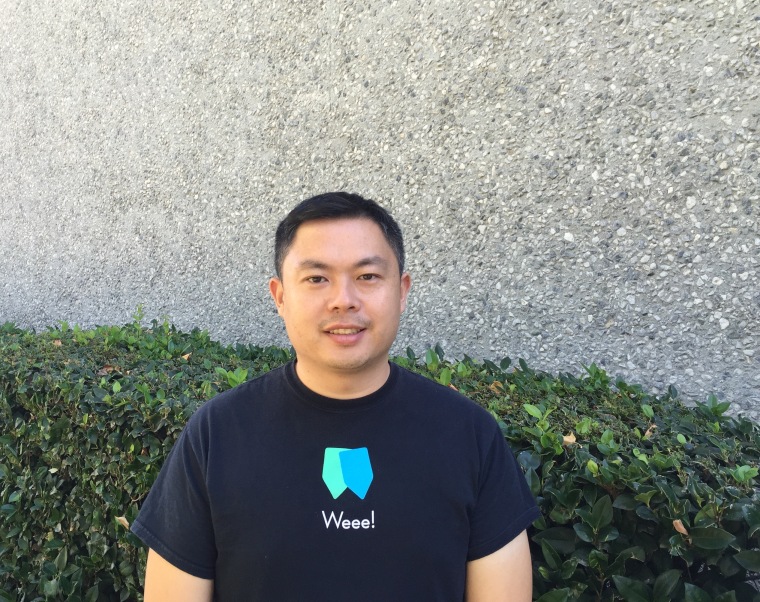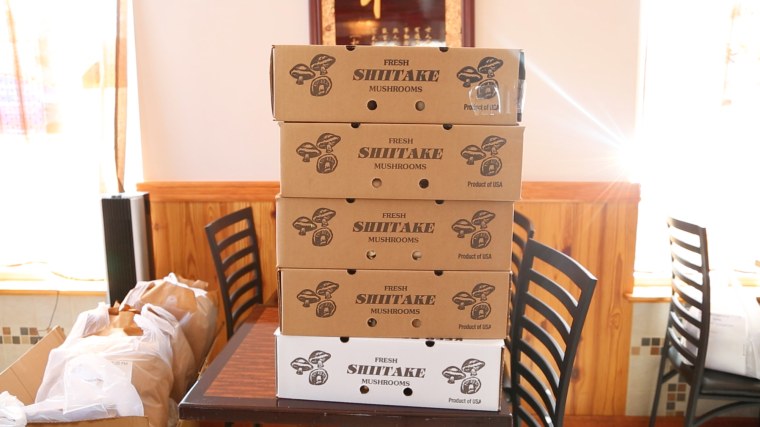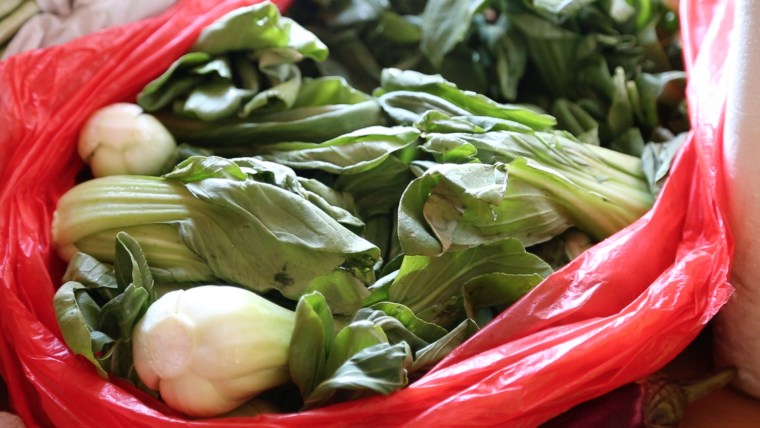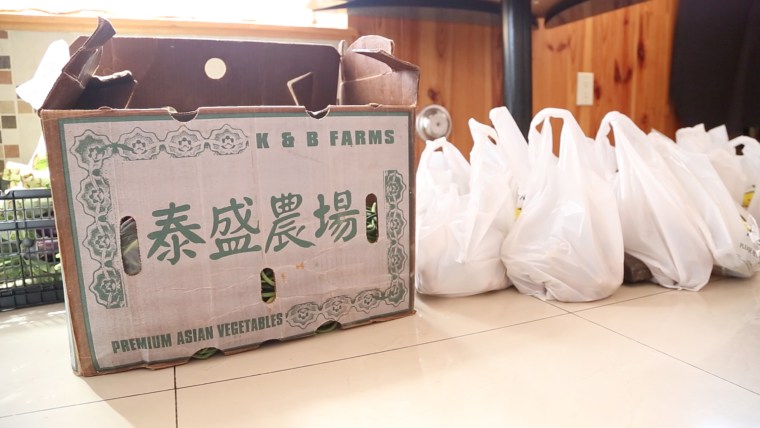MIDDLESEX COUNTY, N.J. — Boxes of fresh shiitake mushrooms sit stacked on a table where customers usually eat. Plastic shopping bags filled with orders occupy nearby seats. A cooler chest rests on the floor.
Not everyone lined up in front of the counter of East Asian Fusion restaurant is here for a meal. Many have come instead to pick up everything from Chinese goods to farm-fresh produce they’ve ordered through Weee!, a startup founded in January 2015.
“We all want to find authentic Chinese food, but it’s so far away from New York,” customer Gia Gao told NBC News.
Weee! banks on the power of social group buying to bring customers goods that might otherwise be hard to get.
The underlying concept works so: A friend tells you about someone she knows who gets a product like fresh crabs for a good price. Trusting your friend, you order a dozen. You cook the crabs and love them, so you tell another friend who places his own order.
In China and for the Chinese community in the U.S., these transactions play out regularly on WeChat, a social media app developed by Chinese internet company Tencent.
“Just like Amazon is the infrastructure for e-commerce, we want to be the infrastructure for social messaging groups.”
WeChat, which Tencent has said has 938 million monthly active users, has proven particularly useful in organizing such purchases since it allows for the creation of groups and for existing members to add others along the way.
Group buying has become especially popular among Chinese living in parts of the U.S. far away from Chinatowns.
“Someone in the group who was quite resourceful would talk to the buyer, negotiate the price, get orders from the group, and then have the products shipped to the neighborhood, so everybody can pick up,” Larry Liu, the company's founder, told NBC News from the company headquarters in Fremont, California.
Those pick-up points, which Liu said are mostly in suburban areas, could be anything from a car in front of a school to the garage of a group leader to a restaurant like East Asian Fusion in Plainsboro Center.
Part of group buying's draw is the lower prices customers sometimes pay, Liu said. But the bigger part, he added, is the social aspect of the buying experience itself, namely being in a group with friends with similar tastes who inspire one another to buy similar things.
“Trust is a huge factor that makes this work,” Liu said.
Liu's startup works to streamline that process. On Sayweee.com, customers enter their zip code or search by product to find a group. After the initial buy and pickup, leaders can add new customers to their WeChat groups, allowing them to keep in touch directly with future offerings.
Since it was started in 2015, Weee! has grown to at least 40 states and Canada, and boasts close to 300,000 registered users, according to Liu and the company.
That flexibility has proven particularly attractive to those who’d otherwise have to drive long distances to shop, customers say.

For Emily Lin, a kindergarten teacher living in Santa Clara County, California, the vegetable and fruit selection at her local Chinese supermarket is not always fresh if she arrives later in the day, she said. There’s also the headache of traffic and trying to find parking.
But none of that’s a problem with Weee!, she said.
“Every group leader, you can go to their house to pick it up,” Lin told NBC News. “It’s very close to your place. For me it’s a three minute ride. You can also walk like five or six minutes at most.”
Zhang Wei, of Yardley, Pennsylvania, also cited convenience as a reason why she’s been a Weee! customer for about a year. To get to a supermarket that sells Asian produce, she said it takes about 20 minutes to drive to Princeton, New Jersey, or half an hour to Plainsboro.
Pickups in Yardley, a community that borders the Delaware River, usually require just a 10-minute car ride, she said.
With a daughter less than six months old, Zhang has been using the platform to buy already-made Chinese food, often from restaurants.
“I could cook, but sometimes I’m busy,” Zhang told NBC News.
Born and raised in China, Weee!’s founder Liu was added to WeChat buying groups while living in California, where he earned an MBA at the University of California, Davis. The groups offered everything from seafood to fresh fruits and vegetables from local farms, to snacks from China, and cosmetics from Japan, he said.
Married with three children, Liu quit his Silicon Valley job in finance in 2014 after getting his green card, he said. He also immersed himself in social shopping by becoming the leader of a WeChat buying group during the 2014-2015 winter.
The 36-year-old wasn’t new to the world of buying and selling. Soon after arriving in the U.S. in 2003, Liu said he began purchasing electronics from retailers and reselling them on eBay, a nearly 10-year hobby that netted him a handsome profit.
But for his WeChat experiment, Liu didn’t hawk cameras like he did on eBay — instead, he sold pork bellies.
“The Chinese tradition is people make sausages during that time,” he said, referring to the mid-winter months. “To make sausages, you need pork with some fat on it. You don’t want just lean meat.”
At that time, the going rate for pork bellies sold at Chinese supermarkets was $4.99 a pound, Liu said. Someone told him he could get them for $2.50 a pound if he bought directly from a wholesaler.
Liu said he wasn’t looking to make a profit with the sales. He was instead trying to learn the ropes by mimicking what was being done in other buyer groups.
“I just offered them the same price, and sold a few hundred pounds of pork bellies,” Liu explained. “But then people asked for all kinds of things, and I also went out to actually look for things I could offer to the group. That’s how we got started.”
Liu also learned that being a WeChat group leader or organizer was a lot of work.
“She has to do the product sourcing, she has to talk to so many suppliers, negotiate price, arrange logistics,” he explained.

For their part, prospective group leaders can apply to sell products offered by Weee! or third-party vendors who list them on the website, Liu said. Assuming all the tax paperwork checks out, those approved receive a 5 to 20 percent cut of revenue as commission, according to Liu.
Group leaders looking to sell things not offered on Sayweee.com, however, need to do the legwork to find suppliers, Liu said.
Weee! profits in different ways depending on its role. As a supplier, for instance, it does so by buying low and selling high, Liu said.
Third-party vendors can currently list their products on the platform for free, Liu added. “We want to charge as our future source of revenue, but we don’t charge yet,” he said.
“Our product assortment is kind of like Costco,” Liu said. “Pretty much everything.” That includes pianos and cars.
But what happens if customers are unhappy with a purchase or if a food item has gone bad?
“If [group leaders] screw up, if they don’t provide good service or good products to the group, [the customers are] going to leave and they’re going to lose their chance to sell to these people forever,” Liu explained.
"Trust is a huge factor that makes this work."
That works because the groups essentially self-police. Disgruntled customers can complain about leaders and suppliers on their WeChat groups, jeopardizing their reputation among other WeChat friends, according to Liu.
That threat typically spurs leaders to work out disputes with their customers, lest they lose their business, Liu said. It’s also why they don’t need a mechanism to let users leave online reviews of leaders, he explained.
Weee! does have a customer support team and provides refunds to dissatisfied customers for goods that it sells, according to Liu.
Group buying is hardly a new phenomenon. Popular websites like Groupon, allow users to purchase deals on anything from spa treatments to restaurant dinners for much less than they’d cost if they bought them on their own.

But Weee! is different in that lowering the price is not the most important goal, according to Liu.
“You go to Weee! because you get unique products recommended by people just like you,” he said.
While Weee! is geared mostly toward a Chinese-language audience, Liu said they’ve also successfully piloted it in the Indian-American community of San Francisco’s Bay Area using WhatsApp, another popular social messaging app.
As for the unusual name of his company, Liu credited his three daughters.
“They all say, ‘Weee!’ when they slide down the slide,” he said. “It’s a happy sound to me.”
“And also I want to emphasize the group nature and social nature of this service,” Liu added.
Liu said he hopes to expand Weee! to Facebook messenger and someday reach beyond the Asian-American community for his customer base.
“Just like Amazon is the infrastructure for e-commerce, we want to be the infrastructure for social messaging groups,” Liu said.
Follow NBC Asian America on Facebook, Twitter, Instagram and Tumblr.
